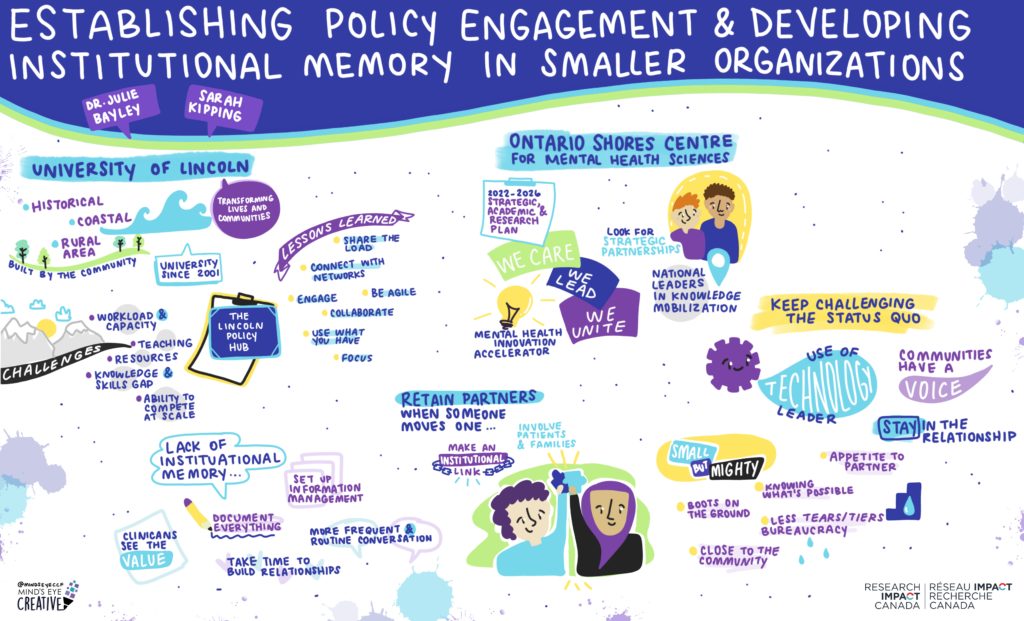On November 30, 2022, Research Impact Canada (RIC) and Universities Policy Engagement Network (UPEN) jointly hosted their third webinar in a three-part series. The topic was on establishing policy engagement and developing institutional memory in smaller organizations. This topic was chosen because research impact and policy engagement happen beyond big institutions, such as the Russell Group in the UK or the U15 in Canada. This webinar looks at the achievements and challenges of such work in institutions/organizations where there is less of a tradition to do this yet they have done so successfully.
Our fantastic moderators, David Phipps (York University/RIC) and Justin Fisher (Brunel University/UPEN), facilitated the panel. Our wonderful panelists were:

Key Takeaway Messages
- In Thunder Bay, Ontario, Ontario Shores is situated in a one-town-one institution-one-university model that, while « small » is « mighty. Ways the organization has interwoven policy engagement and research impact include:
- Incorporating academic and research plans into its 2022-2026 strategic planning
- Working with the community and the province by looking at shared step models and how technology can advance those models and evaluate them
- Looking at ways to support different pathways for different populations and how to test and evaluate them
- Increasingthe capacity of its workforce through team-based models and microcredential pursuits
- Engaging with universities in the KMb field through contributions to curriculums, publications, and conference presentations
- Creating an accelerator program to drive key programming forward, build on partnerships, and build collaborative spaces
- For the University of Lincoln, despite being situated in a rural and coastal geographical area with pockets of deprivations, the university effectively practices research impact by working with the region directly. It opens its campus and its doors so that engagement is true across the sector. Some of these strategies include:
- Building partnerships and looking at projects that affect coastal communities (e.g. rural/small businesses, agriculture, tourism, etc.) and using the university as an engine of support
- Investing in people to understand what impact is because then they will understand why it matters and how to do it well
- Looking at government opportunities – e.g. training doctors to stay in the region by building a medical school on campus
- With respect to policy engagement, some strategies include: allocating policy funds to put resources into policy engagement activities and building a policy hub as an internal resource and external digital platform
- Some challenges smaller institutions face include: workload capacity from staff, fewer resources, capped funding, capped knowledge expansion, and ability to compete at scale
- Lessons learned: Connect with external networks, engage inwards and outwards, recognise competing pressures, develop focused ‘engine’ rooms, collaborate internally and externally, use what you have and invest smartly, adapt processes to support not block, celebrate who you are
*About the Organizers*
Research Impact Canada (RIC) is committed to helping universities and other organizations across Canada maximize the impact of research for communities. From sharing best practices, co-developing resources, to delivering training in knowledge mobilization skills, we are an open and collaborative network of 20+ universities (and growing!) across Canada. Learn more at: https://researchimpact.ca/(opens in a new tab)
The Universities Policy Engagement Network (UPEN) is a community of UK universities committed to increasing the impact of research on policy. UPEN offers a dedicated contact point for policymakers, and a collective response to requests for evidence. It organises knowledge exchange events with government, parliament, devolved bodies, and identifies mechanisms to take forward specific projects. Learn more at: https://www.upen.ac.uk/